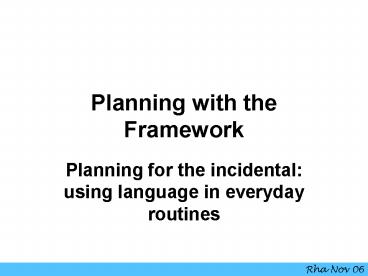Planning with the Framework - PowerPoint PPT Presentation
Title:
Planning with the Framework
Description:
Planning with the Framework Planning for the incidental: using language in everyday routines Rha Nov 06 Timing & timetabling! Part 2 Framework Primary Language ... – PowerPoint PPT presentation
Number of Views:53
Avg rating:3.0/5.0
Title: Planning with the Framework
1
Planning with the Framework
- Planning for the incidental using language in
everyday routines
Rha Nov 06
2
Timing timetabling!
- Part 2 Framework
- Primary Language Learning An introduction to
the Framework for all users. P.9 - schools will plan for no less than 60 minutes
per week of dedicated language time. This
might be divided into relatively short sessions,
for example - 15 minutes per day
- 3 x 20 minutes
- 2 x 30 minutes plus one shorter session of 10
minutes - In addition to this dedicated time allocation,
teachers - should seek opportunities during the week to
enable - children to use their newly acquired language
skills.
Rha Nov 06
3
Timing timetabling!
- Part 2 Framework
- 2. Co-ordinating Provision Advice for Head
Teachers, - Senior Managers and Subject Co-ordinators p.25
- The Framework encourages schools to integrate
- language learning into the existing curriculum as
much as - possible. Through a combination of dedicated
language - lessons, teaching language through other subjects
areas, - and using language for real purposes in daily
classroom - routines, schools have found that they can meet
the - recommended time allocation of 60 minutes..
Rha Nov 06
4
An hour a week .?
- 5 minutes a day 25 minutes a week
- 10 minutes a day 50 minutes a week
- Language in everyday routines supports Oracy
- Literacy
- Intercultural Understanding,
- Knowledge about Language
- and is a Language Learning Strategy
Rha Nov 06
5
What do we do every day? Could we do it in a
foreign language?
- answering the register and dinner register
- greeting each other around the school
- getting rewards for good work
- writing the date, getting out equipment
- looking around the room when things get boring
- quiet reading and browsing in the library
- filling the odd minutes
Rha Nov 06
6
Answering the register can be different every day
- bonjour / au revoir / déjeuner / sandwichs
- a word with a new sound e.g. chien
- the name of a town e.g. Paris
- présent / présente
- personal information e.g. age / pets / birthday
month - different words in a topic area e.g. colours /
places in town / classroom objects - words in sequence e.g. numbers, days, months
- teacher gives a word e.g. le football / la
géographie / le bleu / les chats, children state
opinion using jadore / jaime / je naime pas /
je déteste
Rha Nov 06
7
Its not just about practising vocabulary
- Oracy O3.2 Recognise and respond to sound
patterns and words - O5.2 Understand and express simple opinions
- KAL Imitate pronunciation
- Recognise some basic aspects of agreement
e.g. gender
Rha Nov 06
8
Reward stickers
- Stickers in French can reward good work in any
subject. - Bon anniversaire stickers soon become part of the
class birthday routine! - (Try www.superstickers.com for stickers,
mini-stickers, stampers, certificates and pencils
in French, German and Spanish)
Rha Nov 06
9
Using French around the school
- If teachers start, children soon join in
- bonjour / ça va?
- au revoir
- il fait froid / chaud
- bon appétit!
- bravo! super!
- O3.3 Perform simple communicative tasks
- O6.4 Use spoken language confidently to initiate
and sustain conversations
Rha Nov 06
10
Independent tasks for children
- Writing up the date every day
- Putting up appropriate weather cards
- Checking the birthday calendar and reminding you
to sing Joyeux anniversaire.
Rha Nov 06
11
Posters and displays can do the work for you
- Language posters
- Maps, tourist board posters
- Labels on equipment drawers e.g. papier, cahiers
- Displays of new language
- Can you pronounce all these words?
- L3.1 Recognise some familiar words in written
form - L4.3 Read some familiar words and phrases aloud
and pronounce them accurately - IU3.2 Locate countries where the language is
spoken - IU4.4 Learn about ways of travelling to the
country
Rha Nov 06
12
Language games and action rhymes can fill spare
moments
- vocabulary noughts and crosses
- head, shoulders, knees and toes
- Simon says (Jacques a dit)
- guessing games (flashcards, whiteboard)
- spell a childs name in French, others guess who
it is - count and clap while lining up
Rha Nov 06
13
Et la musique ?
- CDs of French songs
- background music for quiet work
- PE games
- going out and coming in from play
Rha Nov 06
14
Browsing in the class library
- Simple story books or bilingual books
- Familiar stories and fairy tales
- Picture dictionaries
- Non-fiction books dinosaurs, football
- European Bookshop, 5 Warwick St., London W1B 5LU
- www.europeanbookshop.com
- Grant and Cutler, 55-57 Great Marlborough St.,
London W1F 7AY - www.grantandcutler.com
Rha Nov 06































